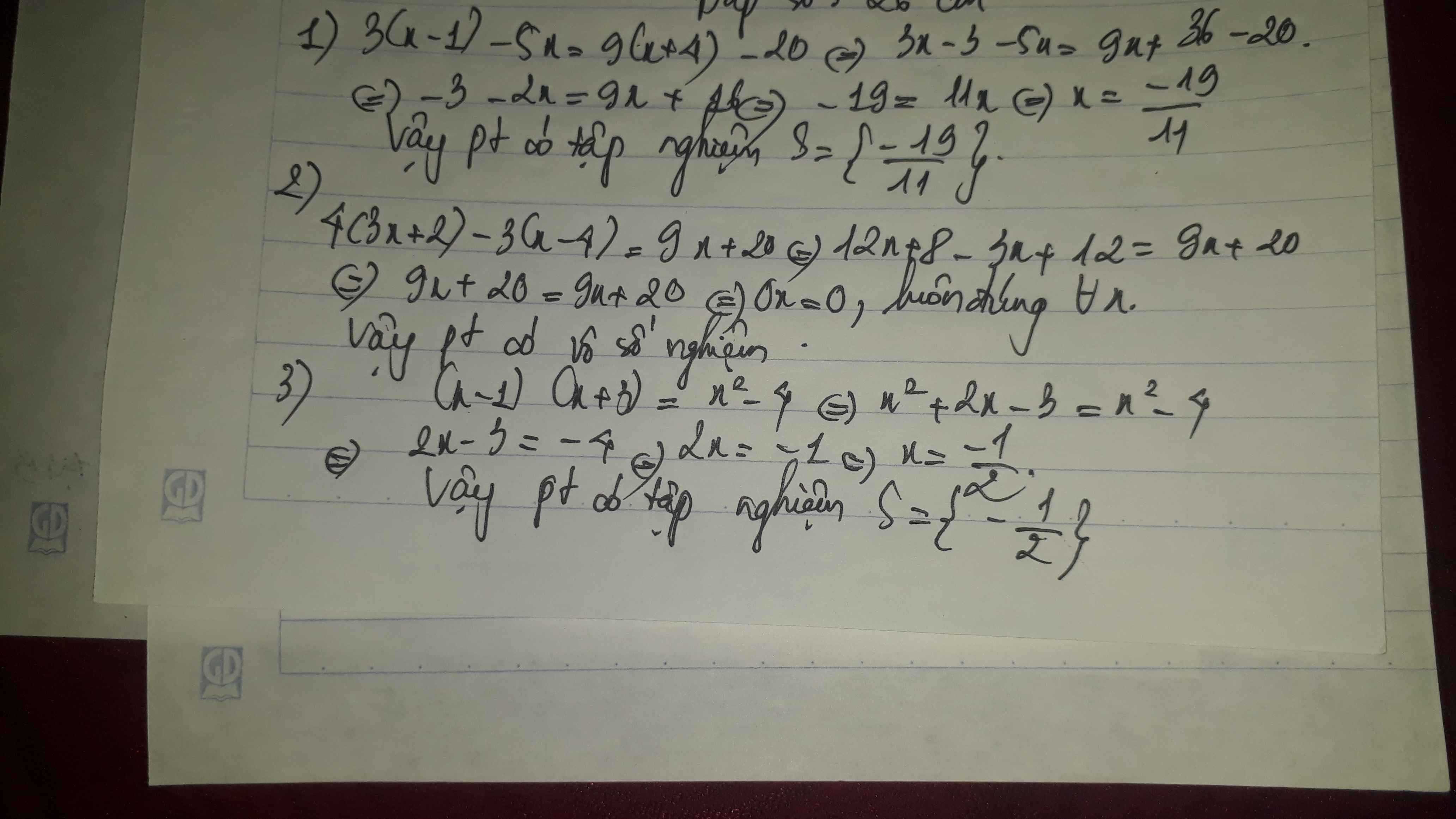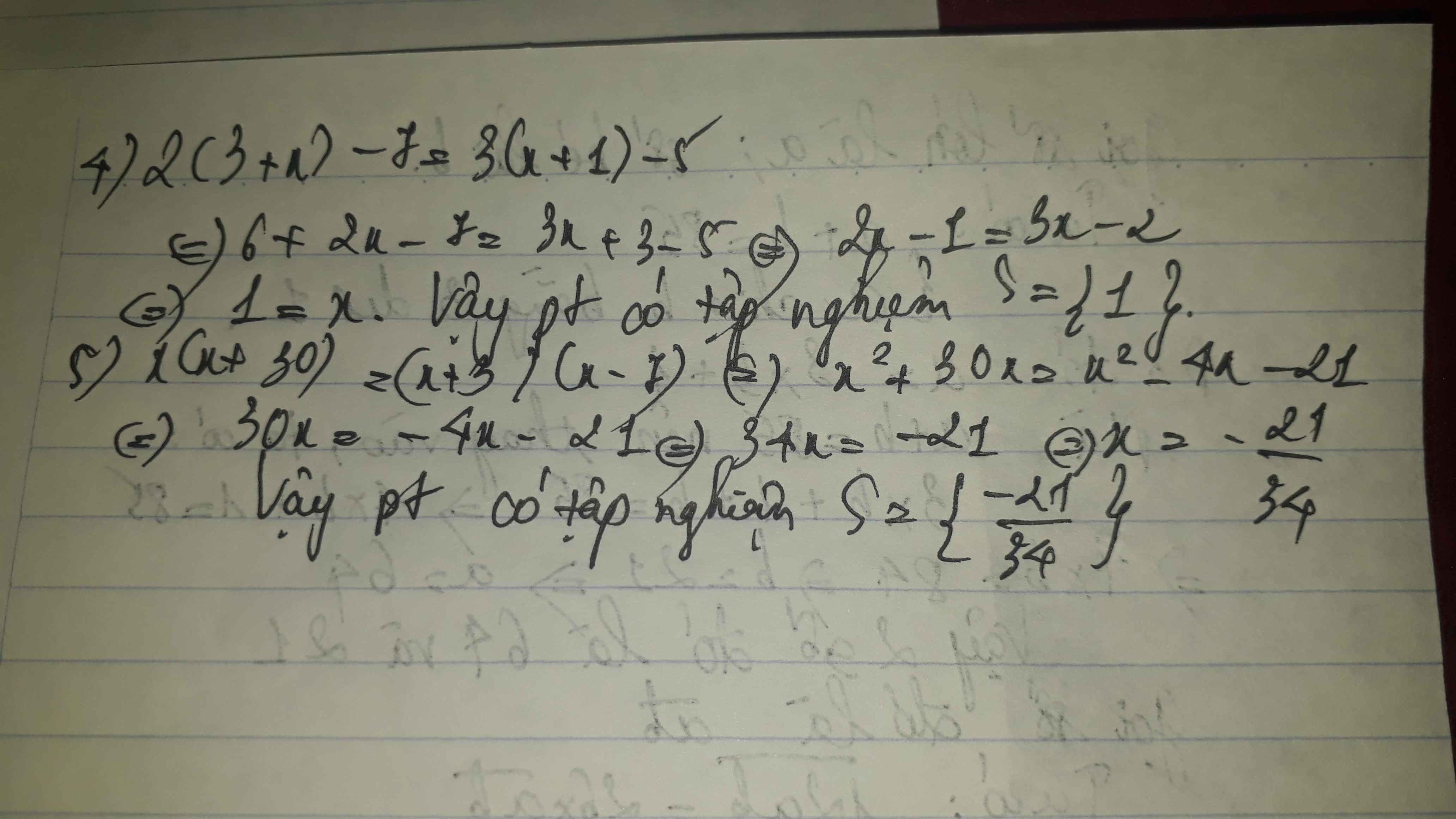Giải các phương trình: x x - 7 3 - 1 = x 2 - x - 4 3
Hãy nhập câu hỏi của bạn vào đây, nếu là tài khoản VIP, bạn sẽ được ưu tiên trả lời.


Mình khuyên bạn thế này :
Bạn nên tách những câu hỏi ra
Như vậy các bạn sẽ dễ giúp
Và cũng có nhiều bạn giúp hơn !
Bài 1.
a) ( x - 3 )( x + 7 ) = 0
<=> x - 3 = 0 hoặc x + 7 = 0
<=> x = 3 hoặc x = -7
Vậy S = { 3 ; -7 }
b) ( x - 2 )2 + ( x - 2 )( x - 3 ) = 0
<=> ( x - 2 )( x - 2 + x - 3 ) = 0
<=> ( x - 2 )( 2x - 5 ) = 0
<=> x - 2 = 0 hoặc 2x - 5 = 0
<=> x = 2 hoặc x = 5/2
Vậy S = { 2 ; 5/2 }
c) x2 - 5x + 6 = 0
<=> x2 - 2x - 3x + 6 = 0
<=> x( x - 2 ) - 3( x - 2 ) = 0
<=> ( x - 2 )( x - 3 ) = 0
<=> x - 2 = 0 hoặc x - 3 = 0
<=> x = 2 hoặc x = 3

\(a,\dfrac{x-3}{x}=\dfrac{x-3}{x+3}\)\(\left(đk:x\ne0,-3\right)\)
\(\Leftrightarrow\dfrac{x-3}{x}-\dfrac{x-3}{x+3}=0\)
\(\Leftrightarrow\dfrac{\left(x-3\right)\left(x+3\right)-x\left(x-3\right)}{x\left(x+3\right)}=0\)
\(\Leftrightarrow x^2-9-x^2+3x=0\)
\(\Leftrightarrow3x-9=0\)
\(\Leftrightarrow3x=9\)
\(\Leftrightarrow x=3\left(n\right)\)
Vậy \(S=\left\{3\right\}\)
\(b,\dfrac{4x-3}{4}>\dfrac{3x-5}{3}-\dfrac{2x-7}{12}\)
\(\Leftrightarrow\dfrac{4x-3}{4}-\dfrac{3x-5}{3}+\dfrac{2x-7}{12}>0\)
\(\Leftrightarrow\dfrac{3\left(4x-3\right)-4\left(3x-5\right)+2x-7}{12}>0\)
\(\Leftrightarrow12x-9-12x+20+2x-7>0\)
\(\Leftrightarrow2x+4>0\)
\(\Leftrightarrow2x>-4\)
\(\Leftrightarrow x>-2\)

Bài `1:`
`h)(3/4x-1)(5/3x+2)=0`
`=>[(3/4x-1=0),(5/3x+2=0):}=>[(x=4/3),(x=-6/5):}`
______________
Bài `2:`
`b)3x-15=2x(x-5)`
`<=>3(x-5)-2x(x-5)=0`
`<=>(x-5)(3-2x)=0<=>[(x=5),(x=3/2):}`
`d)x(x+6)-7x-42=0`
`<=>x(x+6)-7(x+6)=0`
`<=>(x+6)(x-7)=0<=>[(x=-6),(x=7):}`
`f)x^3-2x^2-(x-2)=0`
`<=>x^2(x-2)-(x-2)=0`
`<=>(x-2)(x^2-1)=0<=>[(x=2),(x^2=1<=>x=+-2):}`
`h)(3x-1)(6x+1)=(x+7)(3x-1)`
`<=>18x^2+3x-6x-1=3x^2-x+21x-7`
`<=>15x^2-23x+6=0<=>15x^2-5x-18x+6=0`
`<=>(3x-1)(5x-1)=0<=>[(x=1/3),(x=1/5):}`
`j)(2x-5)^2-(x+2)^2=0`
`<=>(2x-5-x-2)(2x-5+x+2)=0`
`<=>(x-7)(3x-3)=0<=>[(x=7),(x=1):}`
`w)x^2-x-12=0`
`<=>x^2-4x+3x-12=0`
`<=>(x-4)(x+3)=0<=>[(x=4),(x=-3):}`
`m)(1-x)(5x+3)=(3x-7)(x-1)`
`<=>(1-x)(5x+3)+(1-x)(3x-7)=0`
`<=>(1-x)(5x+3+3x-7)=0`
`<=>(1-x)(8x-4)=0<=>[(x=1),(x=1/2):}`
`p)(2x-1)^2-4=0`
`<=>(2x-1-2)(2x-1+2)=0`
`<=>(2x-3)(2x+1)=0<=>[(x=3/2),(x=-1/2):}`
`r)(2x-1)^2=49`
`<=>(2x-1-7)(2x-1+7)=0`
`<=>(2x-8)(2x+6)=0<=>[(x=4),(x=-3):}`
`t)(5x-3)^2-(4x-7)^2=0`
`<=>(5x-3-4x+7)(5x-3+4x-7)=0`
`<=>(x+4)(9x-10)=0<=>[(x=-4),(x=10/9):}`
`u)x^2-10x+16=0`
`<=>x^2-8x-2x+16=0`
`<=>(x-2)(x-8)=0<=>[(x=2),(x=8):}`

Câu 1 :
a, \(\frac{3\left(2x+1\right)}{4}-\frac{5x+3}{6}=\frac{2x-1}{3}-\frac{3-x}{4}\)
\(\Leftrightarrow\frac{6x+3}{4}+\frac{3-x}{4}=\frac{2x-1}{3}+\frac{5x+3}{6}\)
\(\Leftrightarrow\frac{5x+6}{4}=\frac{9x+1}{6}\Leftrightarrow\frac{30x+36}{24}=\frac{36x+4}{24}\)
Khử mẫu : \(30x+36=36x+4\Leftrightarrow-6x=-32\Leftrightarrow x=\frac{32}{6}=\frac{16}{3}\)
tương tự
\(\frac{19}{4}-\frac{2\left(3x-5\right)}{5}=\frac{3-2x}{10}-\frac{3x-1}{4}\)
\(< =>\frac{19.5}{20}-\frac{8\left(3x-5\right)}{20}=\frac{2\left(3-2x\right)}{20}-\frac{5\left(3x-1\right)}{20}\)
\(< =>95-24x+40=6-4x-15x+5\)
\(< =>-24x+135=-19x+11\)
\(< =>5x=135-11=124\)
\(< =>x=\frac{124}{5}\)

a: \(\Leftrightarrow\left(4x+14\right)^2-\left(3x+9\right)^2=0\)
=>(4x+14+3x+9)(4x+14-3x-9)=0
=>(7x+23)(x+5)=0
=>x=-23/7 hoặc x=-5
\(a,\\ \Leftrightarrow7x^2+58x+115=0\\ \Leftrightarrow\left(x+5\right)\left(7x+23\right)=0\\ \Leftrightarrow\left\{{}\begin{matrix}x+5=0\\7x+23=0\end{matrix}\right.\Leftrightarrow\left\{{}\begin{matrix}x=-5\\x=-\dfrac{23}{7}\end{matrix}\right.\)
\(b,\\ \Leftrightarrow\left[\left(x+1\right)\left(x+5\right)\right]\left[\left(x+3\right)\left(x+4\right)\right]=0\\ \Leftrightarrow\left(x^2+6x+5\right)\left(x^2+6x+8\right)=0\\ \LeftrightarrowĐặt.x^2+6x+5=a\\ \Leftrightarrow a=a\left(a+3\right)=10\\ \Leftrightarrow a^2+3a-10=0\\ \Leftrightarrow\left(a+5\right)\left(a-2\right)=0\\ \Leftrightarrow\left[{}\begin{matrix}a=-5\\a=2\end{matrix}\right.\Rightarrow\left[{}\begin{matrix}x^2+6x+5=-5\\x^2+6x+5=2\end{matrix}\right.\\ \Leftrightarrow\left[{}\begin{matrix}x^2+6x+10=0\\x^2+6x+3=0\end{matrix}\right.\\ \left(Vô.n_o\Delta=36-40=-4< 0\right)\)
\(\Leftrightarrow\left[{}\begin{matrix}x=-3+\sqrt{6}\\x=-3-\sqrt{6}\end{matrix}\right.\)

a) Ta có: \(\left|x^2-x+2\right|-3x-7=0\)
\(\Leftrightarrow\left|x^2-x+2\right|=3x+7\)
\(\Leftrightarrow x^2-x+2=3x+7\)(Vì \(x^2-x+2>0\forall x\))
\(\Leftrightarrow x^2-x+2-3x-7=0\)
\(\Leftrightarrow x^2-4x-5=0\)
\(\Leftrightarrow x^2-5x+x-5=0\)
\(\Leftrightarrow x\left(x-5\right)+\left(x-5\right)=0\)
\(\Leftrightarrow\left(x-5\right)\left(x+1\right)=0\)
\(\Leftrightarrow\left[{}\begin{matrix}x-5=0\\x+1=0\end{matrix}\right.\Leftrightarrow\left[{}\begin{matrix}x=5\\x=-1\end{matrix}\right.\)
Vậy: S={5;-1}
bạn giải giúp mình câu b nữa với
mai mình phải nộp bài rồi!!!![]()


⇔ 2x(x – 7) – 6 = 3x – 2(x – 4)
⇔ 2x2 – 14x – 6 = 3x – 2x + 8
⇔ 2x2 – 14x – 6 – 3x + 2x – 8 = 0
⇔ 2x2 – 15x – 14 = 0.
Có a = 2; b = -15; c = -14
⇒ Δ = (-15)2 – 4.2.(-14) = 337 > 0
⇒ Phương trình có hai nghiệm: